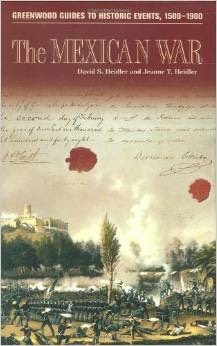Praise from H-War
The authors examine the conflict from both U.S. and Mexican perspectives, paying careful, indeed very welcome, attention to the colonial origins that shaped both nations, but also to the internal conflicts driving some of the more important political considerations within the two countries. More broadly, they analyze how Americans and Mexicans understood themselves as peoples. This is quite a bit to expect from a guide written for the uninitiated. Mostly, the authors realize it by balancing breadth, concision, and analysis with a clear narrative structure. For astute readers, there are some gems.
— Ricardo A. Herrera
ISBN: 0-313-32792-0
LC Card Number: 2005018724
LCC Class: E404
Dewey Class: 973
Excerpt
Antonio López de Santa Anna Described
The world would judge him as complex, but he was less complicated than clever, a collection of appetites and ambitions that found expression in one overarching trait, which was a capacity for survival. Santa Anna was born into privilege, a criollo whose heritage was peninsulare, the inheritor of a large estate in the high country of Jalapa, which he continuously added to and improved. He was also the inheritor of the caudillo tradition, the exaltation of the gentleman warrior who was born to rule through power, whose legitimate right to rule in fact derived from his wielding power, the distillation of the concept that might makes right. It was only natural for him to follow the path of the army, his lieutenancy secured in 1812 and his spurs won (as well as his first wound suffered) during the suppression of the Hidalgo and Morelos rebellions. Some writers claim that he learned cruelty during these campaigns, which is perhaps true, but it is not so easy to determine the reason for his habitual duplicity. Santa Anna climbed the officer ranks to become a lieutenant colonel through a combination of obsequious service and bona fide bravery, but he never cultivated loyalty as a habit. He instead remained vigilant for opportunities and rarely saw one he did not grasp. Betraying a cause that had earlier claimed his devotion was easy for him, and every single person who trusted him eventually regretted doing so. Strangely, however, Santa Anna’s betrayals never more than temporarily estranged his victims. He enchanted and alienated the Mexican people no less than eleven times, seizing power with their blessing and falling from grace in an astonishing cycle of recrimination and reconciliation. The only constant in his character was his artful talent to foist off transparent lies as obvious truths, for he was a chameleon who could be generous then stingy, brutal then kind, wise then foolish, affectionate then cruel. His pursuit of power was, like his seduction of women, more important than the attainment of it or the conquest of them. He never completed one of his eleven terms as leader of Mexico, and he proved remarkably indifferent to exercising power in any deliberate, diligent, or thoughtful way. Instead, he ruled in fits and starts, reacting with bursts of energy to circumstances or threats, otherwise retreating into languor and self-indulgence, all the while looting the treasury for costly personal pleasures. This was the man to whom Mexico fell victim in its crucial formative years.
From The Mexican War (2005)
